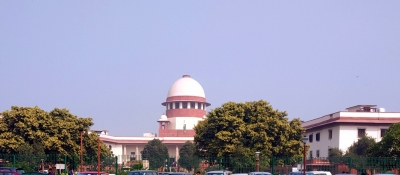SC agrees to hear plea against Maratha quota law in July
By IANS | Updated: June 26, 2025 15:13 IST2025-06-26T15:05:23+5:302025-06-26T15:13:51+5:30
New Delhi, June 26 The Supreme Court on Thursday agreed to hear, in July, a plea challenging the ...

SC agrees to hear plea against Maratha quota law in July
New Delhi, June 26 The Supreme Court on Thursday agreed to hear, in July, a plea challenging the decision of the Bombay High Court, which had directed that the interim order passed last year, allowing the Maratha community to avail 10 per cent reservation in educational institutions and public employment, will continue to remain in force.
After a lawyer mentioned the matter for urgent listing, a Bench of Justices K.V. Viswanathan and N.K. Singh assured of listing the plea on the re-opening of the top court (i.e. after July 14).
In an order passed on June 11 this year, the Bombay High Court allowed the Maratha community to provisionally avail the benefit of 10 per cent reservation, subject to the final outcome of the petitions challenging the validity of the contentious Maharashtra State Reservation for Socially and Educationally Backwards Classes (SEBC) Act, 2024.
The SEBC Act, allowing 10 per cent quota for the Maratha community, was passed by the previous Eknath Shinde-led government in February last year after the Justice (retd) Sunil Shukre-led Maharashtra State Backward Class Commission (MSBCC) opined that "exceptional circumstances and extraordinary situations exist" to grant benefit of quota to Maratha community beyond the 50 per cent threshold.
Notably, the Supreme Court had struck down a similar quota law enacted by the Maharashtra legislature in 2018 for having breached the 50 per cent cap fixed in the 1992 landmark Indra Sawhney case (Mandal Commission case).
A five-judge Constitution Bench, in its judgment passed in May 2021, had opined that it could not find any exceptional circumstances or extraordinary situation for allowing a 12-13 per cent quota for the Maratha community and struck down the Maharashtra Socially and Educationally Backward Classes (SEBC) Act, 2018.
Further, the Supreme Court had declared that states do not have the power to prepare lists for socially and educationally backward classes and ruled that the President had the sole power to identify a community as backward.
It had also declined to entertain the review plea moved by the Maharashtra government seeking a relook at the judgment. Before this, the apex court had dismissed a plea by the Union government seeking reconsideration of the May 5, 2021, judgment.
Disclaimer: This post has been auto-published from an agency feed without any modifications to the text and has not been reviewed by an editor
Open in app